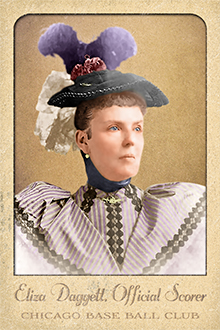
- Series: Pioneer Portraits II: 1875-1899
- City: Chicago
- Team: White Stockings
- League: National League
Eliza G. Green Williams Brown Daggett (1851-1926) was hailed in her hometown in 1920 as “the woman who has made Attleboro famous.” As the first female in the Bay State to seek mayoral office, Eliza was, indeed, noteworthy. But it was her surreptitious labors for Al Spalding under her maiden name that earned her a place in the annals of baseball as well as politics.
Al Spalding's White Stockings (Cubs) had many a fractious player - “kickers” in the jargon of the day. Spalding needed someone to bring a sane, objective and expert eye to the task of recording for posterity the hits, errors and miscellanea of the club's performance; someone impervious to the importuning of players lobbying for favorable rulings from the scorekeeper. He found what he needed in a lady who lived across from the ballpark, a woman who was an avid fan and an inveterate record-keeper. Eliza scored every home game and she had the cool, detached manner of a secret agent. Spalding recruited her to be his anonymous official scorer and, for a decade (1882-91), Eliza sat with the players' wives, keeping meticulous score and passing judgement on hits and errors - even settling player arguments - but never betraying her professional role. The National League officials to whom Eliza dispatched her score cards never knew that “E.G. Green” was a woman, allowing Spalding to avoid the scandal that would have ensued had it been known that a woman held such an important job in the sports world of Nineteenth Century America.
- Eliza was able to avoid detection completely, even from club-omniscient captain Adrian Anson, despite the fact that Eliza usually performed her duties while sitting beside Anson's wife.
- Apparently, Eliza kept the secret even from her family. Her son Charles recounts that he would mail the scorecards to Major League Baseball for his mother, without ever knowing the contents or purpose of the packages.
- Daggett was a devoted suffragist, a friend of Susan B. Anthony, and a tireless campaigner for the Republican Party long before seeking office for herself
- Her son Charles Williams was team treasurer for the Cubs during their championship season of 1908
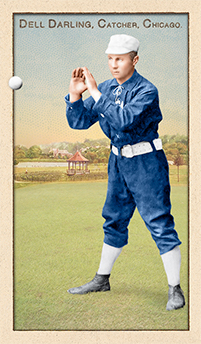
- Series: Beginnings: 1880's
- City: Chicago
- Team: White Stockings
- League: National League
Conrad Darling (1861-1904) was a modest-hitting journeyman catcher knocking around the hard-scrabble baseball towns of western Pennsylvania when The Sporting Life took note of his work following the 1886 season: “Darling was undoubtedly the most valuable man behind the bat in the International League.” Suddenly, Dell was in demand, spurning an offer from Jim Mutrie’s Giants and signing with Cap Anson’s Colts. He played well but sporadically until trying his fortune with Comiskey’s Chicago Pirates in the 1890 Players’ League. His career was in steep decline, likely due to the usual toll of catching in the big leagues. Dell played only part time for the Browns in ‘91 before hanging ‘em up. He did gain a short bit of notoriety by being implicated in a massive scheme to rob moving trains. He and other ballplayers were accused of pilfering baggage and tossing the spoils to confederates trackside. The publicity faded shortly with no indictment.
- The origin of Darling’s nickname is unknown but stayed with him through his obituary
- It was speculated that an old baseball injury contributed to Dell’s early demise
- Darling's uniform color in this card was changed from black to blue in March, 2017 to reflect recent reliable research conducted by Craig Brown and friends at Threads of Our Game. One card had been previously released featuring a black uniform.
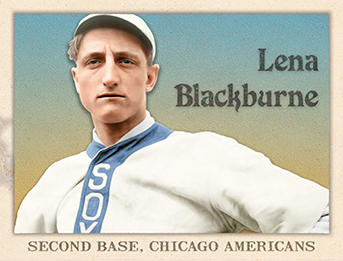
- Series: Diamond Heads '15
- City: Chicago
- Team: White Sox
- League: American League
Russell Aubrey Blackburne (1886-1968) was no great shakes as a player and had a sub-.500 career as a manager. Not many with a lifetime .214 average get mentioned at Cooperstown. But Lena had a bulldog spirit and a zeal to improve one key aspect of baseball: the sheen on the balls themselves. Until Blackburne’s “Rubbing Mud,” balls were doctored with tobacco juice, Shinola, and whatever the local swamps provided, all in an attempt to take some of the manufacturer’s shine off the spheres. Lena found a solution that still serves the game today. True to his discoverer’s spirit, he kept secret the source of the clay from which he made the rubbing compound. It was believed to be a spot on the Delaware River near his home. Blackburne had played for the White Sox, Reds, Braves, and Phillies before coaching and managing for the Sox, Browns and Athletics. He was enough of an AL-partisan to restrict use of his wonder-mud to the American League until the mid-1950s when the NL at last could partake.
- No other compound improved the grip on the ball without damage to the horsehide
- No one has gotten rich from the Mud. Team’s can get by with one 32-oz container per season at a cost of about $60. The current vendor of Blackburne’s concoction has to work full-time to support his family
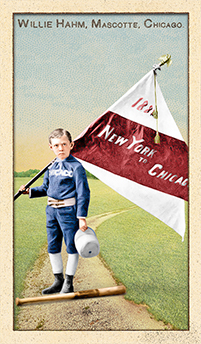
- Series: Beginnings: 1880's
- City: Chicago
- Team: White Stockings
- League: National League
Willie Hahm, also known as “Master Willies,” was a rarity among early baseball mascots. He was white. The youngster, said to have been barely able to talk when first brought to the dugout, was the diminutive talisman for the Chicago White Stockings in the mid-1880s. “The Chicagos have great confidence in him as a promoter of success and make a great fuss over him” said Louisville Colonels manager Jim Hart in one of the earliest interviews explicating the curious role of mascots in America’s game. After triumphing in the 1884 campaign, Hart said the Sox had paraded Hahm at the head of their procession in an open landau. The Chicago Tribune reported on a big match with the rival Wolverines on June 18, 1886. Al Spalding brought a trainload of boosters to Detroit in hopes of preventing the eclipse of Chicago’s record home winning streak. Downtown Motor City was treated to the spectacle of the White Stockings and 200 rabid fans marching from the depot to the Russell Hotel carrying broomsticks with Willie Hahm leading the throng. Later, per the Tribune, “The Chicagos were escorted to the ground by a band, and entered the field behind little Willie Hahm, who carried an immense broom on which were written the words Our Mascot.”
- Many of the early mascots were black kids dragooned by superstitious players such as NY’s Buck Ewing
- The first two releases of this card (2016) were errors: Hahm was misspelled as "Hahn"
- Hahm's uniform color in this card was changed from black to blue in March, 2017 to reflect recent reliable research conducted by Craig Brown and friends at Threads of Our Game. Two cards had been previously released featuring a black uniform.
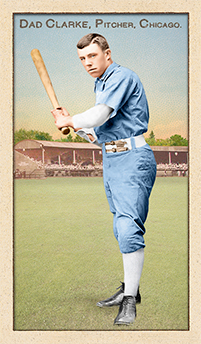
- Series: Beginnings: 1880's
- City: Chicago
- Team: White Stockings
- League: National League
William H. Clarke (1865-1911) learned early why the major leaguers get the big bucks: he had uniformly outstanding success on the mound in the minors with an overall 1.81 ERA. Things were always tougher with the big clubs: an ERA of 4.16 and a journeyman record of 44-51 during seven seasons. Dad’s best year came with the Giants in 1895 where he won 18 with a 3.39 ERA. Things must have looked different when he came out of Lorain, OH to the Sandusky Suds in 1887 winning 21 with a rookie ERA of 1.13. Similar results followed in Des Moines and Omaha. Clarke even got to do a turn out west with the San Francisco Haverlys and a short stay with the Jacksonville (IL) Lunatics where it must have maddened him to go 3-3 despite a 0.87 ERA. Always a strong-willed character (the nickname reflected a grizzled visage), Dad sparred and stormed through a long up-and-down career.
- Per SABR, Dad’s innovative “system” of pitching “slants” influenced Big Train Johnson to perfect his own motion




